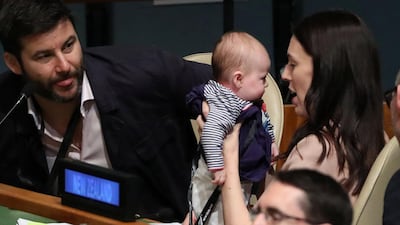A new mum took her baby to work this week and it quickly became international news. Granted, six-week-old Neve is very cute, and her chubby cheeks say "squish me" in whatever language you're reading the headlines. But it is her mother, Jacinda Ardern, prime minister of New Zealand who is the real focus of the story.
Ms Ardern had travelled to attend the United Nations General Assembly in New York. As her baby is small and nursing, she went along too. Neve's dad, the broadcaster Clarke Gayford, was there – at personal expense – to look after her while Ms Ardern was busy.
For most new mums, this is a fairly common experience. For whatever reason, you take the baby into the office, everyone coos for a bit, and then it’s down to work. It’s just that Ms Ardern is possibly the most high-profile woman ever to have done it.
There was already enough consternation when Ms Ardern announced her pregnancy and that she would have her child while in office. Benazir Bhutto, the late two-time prime minister of Pakistan, is the only other leader of a nation to have done so before. More accurately, they are the only two people to have actually given birth while serving as leaders. Plenty of men have fathered children while in office and nobody has wrung their hands. The whole furore over Ms Ardern's ability to run a country and be a mother carries the rotten whiff of misogyny.
Some have criticised Ms Ardern for bringing a baby to a UN meeting, but if she'd left her baby behind she would have been criticised for that, too. Women just can't win. I salute her for showing billions of women around the world that it’s perfectly normal to be a working mother, and that workplaces can and should accommodate this important role. The job of a country’s leader is not just about the nuts and bolts of politics. It is to lead by example and set a tone. This normalisation of working motherhood is something we are increasingly seeing from women on the global stage and it is to be welcomed.
We want and need more women in the workplace and in public life. Many of them will be mothers. Having a prime minister sitting at the UN General Assembly, clearly comfortable with and capable of carrying out both roles is a landmark moment.
Some have asked if it is appropriate to take a child into a meeting where weighty matters of state are being discussed. Maybe we should ask similar questions of the delegates who routinely fall asleep in the chamber. In more ordinary workplaces, what about those people who take constant cigarette breaks, long lunches or spend leisurely hours surfing the internet rather than getting on with their jobs?
We should extend to mothers (and parents in general) the courtesy of expectation that, should they bring their child into the workplace with them, they do so in the certain knowledge that they are still there for work.
The benefits will not be felt just by women. Such a shift in attitudes will also help fathers. We need to see men as people who balance work and family life, too, and to encourage them to take an active role in childcare. Doing so will reduce the heavy responsibility of juggling work, home and kids that falls on the shoulders of women all around the world. It will also allow men to not miss out on their children growing up.
Most workplaces are not sterile laboratories, so they do not need to be cleansed of all trace of normal life. Nor are people who work in them robots. Making employees comfortable and confident enough to bring their lives and experiences with them will make companies more human, more enjoyable to work for and likely more productive. If the UN can do it, so can we.
Shelina Janmohamed is the author of Love in a Headscarf and Generation M: Young Muslims Changing the World


